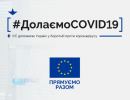The coronavirus pandemic is an unprecedented, global crisis, a severe public health emergency for citizens, societies and economies. EU Member States and many partner countries, including Ukraine, have been severely affected by the current pandemic.
Ukraine, which continues to suffer from acts of aggression in eastern part of the country as well as the illegal annexation of Crimea and Sevastopol by the Russian Federation, has also been affected throughout all spheres of life. The EU welcomes the prevention measures taken by the Ukrainian government in response to the growing COVID-19 spread. We recognise the difficulty of some of these decisions.
The EU will continue to support Ukraine in this unprecedented crisis. In order to alleviate its impact on the health system, people's daily lives and the economy, the EU is preparing a set of assistance measures for individual partner countries, as well as for the Eastern Neighbourhood region as a whole. A first package for Ukraine comprises around €80 million.
Presenting the support package, Commissioner for Neighbourhood and Enlargement Olivér Várhelyi commented: “We stand by Ukraine in these extremely difficult times. With this support package, we aim at saving lives and strengthening societal resilience. We support the Ukrainian response to a spike in health and social assistance needs as well as the protection of businesses and jobs. We know we need to act quickly and efficiently in reinforcing government and civic action.”
The foreseen support package includes the following:
1. Support to the Ukrainian health system, including through a financial contribution to the World Health Organisation (WHO) for its work in Ukraine. Out of €30 million for the entire Eastern Partnership region, which includes €20 million to address the most immediate needs, proportionally the largest contribution is foreseen for Ukraine. This will comprise possibilities to purchase necessary medical supplies and equipment, as well as to strengthen health system’s capacity to respond to the outbreak. Ukraine will also profit from a new EU Initiative for Health Security, which will provide capacity building activities on preparedness for epidemiologists and frontline health staff and advice of specialists from the European Centre for Disease Prevention and Control (ECDC). In addition, the EU is exploring, together with the Ukrainian Ministry of Health, how to assist with capacity building to reinforce the Ministry’s crisis management mechanisms.
2. Support to Ukraine's economy, notably small and medium-sized enterprises (SMEs) by providing liquidity, including via International Financial Institutions (IFIs). The EU is already working with IFIs and relevant financing institutions from EU Member States as TEAM EUROPE in order to facilitate, simplify and accelerate the uptake and reinforcement of existing credit lines and support programmes to SMEs, self-employed and other economic operators. In addition, the Commission will make available €500 million of guarantees planned under the European Fund for Sustainable Development (EFSD) to facilitate the provision of liquidity in the EU’s Neighbourhood including through working capital, trade finance, or moratoria on debt service. At bilateral level in Ukraine, we are accelerating the launch of a new SME support programme (€20 million) under the 2020 EU budget, with a new €10 million made available for lending in hryvnas for SMEs. A programme in support of small farms of €25 million comes in addition to the €26 million allocated already in 2019.
3. Support to the people who are most affected by the crisis, in cooperation with civic partners. We are in a first round mobilising at least €2 million from regional and bilateral instruments for a quick societal relief package in areas such as protection of persons belonging to vulnerable groups, transition to online education, support to the cultural and creative industries and continuation of cultural life online, fighting disinformation, and strengthening community resilience. We pay particular attention to conflict-affected areas in eastern Ukraine where humanitarian and early recovery partners are working on emergency responses to coronavirus. This includes the purchase of protective suits for doctors and disinfectants as well as support to volunteers who deliver food and medicines to the older persons.
Background
The overall funding mobilised for coronavirus-related measures amounts to a total of €140 million for the Eastern Partnership countries (Armenia, Azerbaijan, Belarus, Georgia, the Republic Moldova, Ukraine) of which a significant part will be dedicated to Ukraine. Further measures under the 2020 budget will be added later this year, responding flexibly to emerging needs. This new CODIV-19 related initiative comes on top of recently announced additional €5.2 million in response to the conflict in Ukraine's eastern regions and the destabilisation of the Sea of Azov region.
The Commission can also provide assistance through TAIEX, its peer to peer instrument, by using EU Member States expertise, experience and examples of good practice on assessing emergency preparedness response scheme and health systems.
Furthermore, the EU stands ready to disburse €500 million to the Ukrainian state budget under the Macro-Financial Assistance programme in the form of low-interest loans. Disbursement of these funds is subject to the completion of the actions that Ukraine has agreed with the staff of the International Monetary Fund (IMF) and that are needed for the IMF programme to be submitted to the IMF Executive Board for approval.
The EU, together with its Member States is the biggest donor of conflict response assistance to Ukraine. It has provided over €762.5 million since the beginning of the conflict, of which approximately half accounted for humanitarian aid.
Overall, EU support to Ukraine since 2014 totals over €15 billion in grants and concessional loans in support of Ukraine’s reform agenda as well as the political association and economic integration with the EU.
Source - EU Delegation to Ukraine

